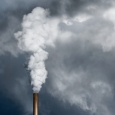Energy Policy Conservation Act (CAFE standards)
The “Energy Policy Conservation Act,” enacted into law by Congress in 1975, added Title V, “Improving Automotive Efficiency,” to the Motor Vehicle Information and Cost Savings Act and established CAFE standards for passenger cars and light trucks. The Act was passed in response to the 1973-74 oil embargo. The near-term goal was to double new car fuel economy by model year 1985.
“Corporate Average Fuel Economy (CAFE) is the sales weighted average fuel economy, expressed in miles per gallon (mpg), of a manufacturer’s fleet of passenger cars or light trucks with a gross vehicle weight rating (GVWR) of 8,500 lbs. or less, manufactured for sale in the United States, for any given model year. Fuel economy is defined as the average mileage traveled by an automobile per gallon of gasoline (or equivalent amount of other fuel) consumed as measured in accordance with the testing and evaluation protocol set by the Environmental Protection Agency".
Commentary
Cry Wolf Quotes
Listen, these are the same people who will be standing in unemployment lines if the Clinton-Gore proposals are put into effect.
The whole CAFE scheme is, in terms of public policy, ridiculous, and has the practical effects of driving U.S. jobs abroad.
If we sell too many big cars in any quarter in 1978, we’ll have to hold back our product mix and we’ll have to ration or allocate cars. The law is final now, but if enough people complain when they can’t get a big car, maybe the government will revise its legislation. To meet 27.5 m.p.g. by ’85, the average weight of cars will have to be about 3,200 pounds versus 4,000 pounds now. That means every car would be a compact, subcompact, or smaller. The new law implies that we must get better fuel economy between 1980 and 1985 then between 1978 and 1980. That’s unlikely.
We have stated that the full-size car market can’t be ignored because it is accounting for 30 percent of domestic auto sales for the model year. Chrysler does not intend to, and would not, abandon a market segment of that size and importance to automotive buyers.
Evidence
-
Blind Spot: The Big Three's Attack on the Global Warming Treaty
eleased during the controversy over the Kyoto Treaty, this study is a serious policy paper, exploring the intersections between transit policy and global warming. It fairly establishes the Big Three have as long history of stubborn obstructionism. (They don't like anyone telling them what to do.)
-
CAFE Standards Not an Undue Burden on Domestic Manufacturers
CAFE standards clearly contributed to increased fuel economy and didn't unduly burden the domestic manufacturers.
-
Experts Claim the National Highway Safety Administration (NHTSA) Saves Lives and Money
Safety experts make the case for the National Highway Safety Administration (NHTSA).
Backgrounders & Briefs
The Success of CAFE Standards
How the CAFE standard and its successes.


